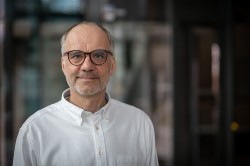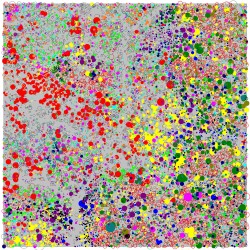Press Release, 11. April 2024
ERC Advanced Grant for UFZ ecologist Thorsten Wiegand
In focus: a better understanding of the spatial coexistence of tree species
Ecosystem modeller Dr Thorsten Wiegand from the Helmholtz Centre for Environmental Research (UFZ) has received around 2.5 million euros from the European Research Council (ERC) for research in the field of theoretical ecology. Over the next five years, he and his UFZ colleague Prof Andreas Huth will develop theory to understand the spatial dynamics and stability of species-rich forests. This is the second ERC Advanced Grant for the scientists.

Photo: Sebastian Wiedling / UFZ

Photo: UFZ
The ERC Advanced Grant is the most highly valued funding programme of the EU for individual researchers and is awarded by the European Research Council (ERC). The ERC thus supports outstanding researchers across all disciplines who have produced internationally important research results. When awarding ERC Advanced Grants, the only criteria taken into account are the academic excellence of the researchers and the exceptional quality of the research project, which is expected to make a particular advance in the state of knowledge. For the 2023 call, 517 applications for life sciences were submitted; of these, 75 (approx. 15%) will be funded.
In the coming years, the Leipzig ERC team will develop spatially-explicit theory on the dynamics of forests (e.g. for temperate and tropical forests). The aim of the "SpatioCoexistence" project ('Towards a Spatial Theory for Species-Rich Communities’) is to better understand the mechanisms that enable the coexistence of tree species. Dr Thorsten Wiegand and Dr Andreas Huth are integrating mathematical models and individual-based simulations with methods from physics and spatial statistics. They use data from forest inventories on large areas of up to 50 ha. In these forest areas, the positions, size, and species of more than 100,000 trees are measured every five years. Such forest inventories are collected worldwide. For example, by the US Smithsonian Institute (ForestGEO network). "If we better understand the dynamics and spatial structure of species-rich communities, this will help to protect terrestrial biodiversity from the effects of climate and land-use change", says Wiegand. The ERC team will for example investigate how seed dispersal by animals (e.g. monkeys, birds) and stochastic events (e.g. droughts and falling trees) influence the spatial structure and dynamics of forests.
"Ecologists have long been trying to understand the coexistence of competing species in species-rich communities such as tropical forests. But this key question of ecological theory has remained largely unresolved", says Wiegand. This gap is due to a scaling problem. "Although trees compete with their nearest neighbours, the usual non-spatial models do not take into account how the dynamics and patterns at larger scales arise from the behaviour of individuals and their interactions with neighbouring trees", says Huth. Wiegand and Huth thus need to find clever ways to integrate information about the spatial patterns of trees into mathematical theories. With the funding from the first ERC Advanced Grant, they analysed mainly spatial structures at the level of individual tree species in order to find out whether these contain important ecological information. They now want to integrate this information into a mathematical coexistence theory. "This is analogous to statistical physics, which describes the macroscopic quantities of thermodynamics through the microscopic behaviour of individual gas molecules", says Huth.
Because the project will analyse mostly existing data, the project funds will be used primarily to support young researchers as well as academic exchange with international experts. This is necessary to cover the various aspects relevant for the development of a new, comprehensive, spatial coexistence theory. To this end, various workshops will be organised at the UFZ. Part of the funding will be used to support field studies in Sri Lanka and Thailand in order to investigate the dispersal patterns of seeds, among other things.
Close cooperation partners in the project are Prof Xugao Wang (Institute of Applied Ecology, Chinese Academy of Sciences, China), Prof Wirong Chanthorn (Kasetsart University, Thailand), Prof Sisira Ediriweera (Uva Wellassa University, Sri Lanka), Prof Nathan J.B. Kraft (University of California, Los Angeles), and Dr. David Alonso Giménez (Blanes Centre for Advanced Studies, Spain).
Thorsten Wiegand studied physics in Marburg, where he received his doctorate in theoretical ecology in 1992. He has been conducting research at the UFZ ever since. His research at the UFZ includes spatial ecology and the investigation of the role of species interactions, spatial patterns, and spatial processes for the biodiversity and dynamics of populations and species communities.
Andreas Huth studied physics and biophysics in Berlin and Marburg. He received his doctorate in 1990 and has been conducting research at the UFZ since 2001. His research focuses on ecological modelling, forest dynamics, vegetation ecology, carbon balances, remote sensing, and complex systems.
Further information
Prof. Dr. Andreas Huth
UFZ Department of Ecological Modelling
andreas.huth@ufz.de
Dr. Thorsten Wiegand
UFZ Department of Ecological Modelling
thorsten.wiegand@ufz.de
UFZ press office
Susanne Hufe
Phone: +49 341 6025-1630
presse@ufz.de
In the Helmholtz Centre for Environmental Research (UFZ), scientists conduct research into the causes and consequences of far-reaching environmental changes. Their areas of study cover water resources, ecosystems of the future, environmental technologies and biotechnologies, the effects of chemicals in the environment, modelling and social-scientific issues. The UFZ employs more than 1,100 staff at its sites in Leipzig, Halle and Magdeburg. It is funded by the Federal Government, Saxony and Saxony-Anhalt.
www.ufz.deThe Helmholtz Association contributes to solving major challenges facing society, science and the economy with top scientific achievements in six research fields: Energy; Earth and Environment; Health; Key Technologies; Matter; and Aeronautics, Space and Transport. With some 39,000 employees in 19 research centres, the Helmholtz Association is Germany’s largest scientific organisation.
www.helmholtz.de